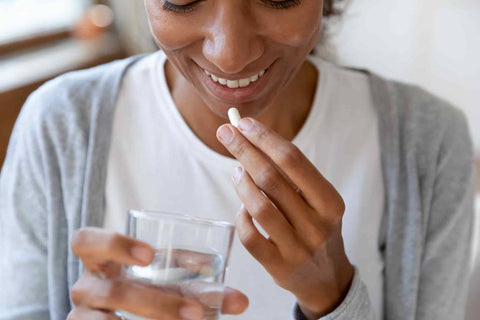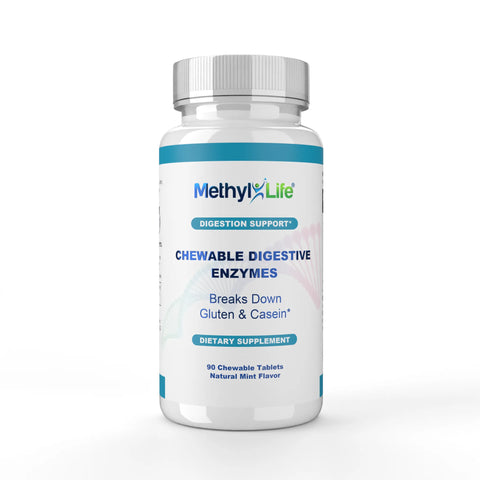
How probiotics and antibiotics can work together
Product Recommendations
Chewable Digestive Enzymes
$46.00
- Ease Your Belly from Post Meal Discomfort
- Assists Breakdown of Proteins, Carbohydrates, Lipids, Gluten & Dairy
- Tastes like a natural, after-dinner mint
- 3rd-Party Tested, Non-GMO, Gluten-Free, 90 Vegan Tablets

Written By:
Katie Stone - Naturopath
Medical Reviewer:
Dr. Nare Simonyan - PhD Pharmaceutical Science
Edited By:
Kari Asadorian - BSN, RNUpdated On:
May 27, 2025What are probiotics?
Probiotics are beneficial bacteria or yeast that can support the balance and function of your gut microbiota. When taken in supplement form, probiotics may provide a range of health benefits, including support for digestion, immune function, and mental wellbeing.3.
Probiotics work by interacting with and stimulating the growth of other beneficial bacteria while ‘crowding out’ harmful bacteria. They also support a healthy immune response to invading pathogens and produce antimicrobial compounds to prevent them from growing.4
Postbiotics are microbial metabolites, such as short-chain fatty acids (SCFAs), that provide direct benefits to overall health by reducing inflammation and improving insulin sensitivity, immune function, gut barrier integrity, and regulating the immune response.5
How do antibiotics affect gut health?
Broad‐spectrum antibiotics are the most commonly prescribed form as they target a wide range of bacterial species. These antibiotics cannot differentiate between ‘good’ and ‘bad’ bacteria, so they kill both. This can lead to an imbalance in the quantity and quality of your gut bacteria, as fewer beneficial microbes make it easier for harmful species to grow and proliferate. For example, antibiotic eradication of beneficial bacteria in the gut allows Clostridium difficile (C. diff) to flourish, often resulting in antibiotic-associated diarrhea and other gastrointestinal symptoms.6
AAD (antibiotic-associated diarrhea) occurs in 5%–35% of people who take antibiotics, depending on the type of antibiotics, the patient’s health, and their exposure to other bacteria.7
Taking probiotics with antibiotics
Taking probiotics alongside antibiotic treatment has been shown to help counteract antibiotic effects in several ways, including:
- Producing antimicrobial compounds that suppress the growth of harmful microbes8
- Competing for receptors and binding sites with pathogenic microbes on the gut lining9
- Strengthening the integrity of the gut barrier, which helps to prevent the invasion of harmful bacteria and subsequent inflammatory responses10
- Fermenting prebiotics (non-digestible fiber) to support the activity and growth of more beneficial microbes (mainly Bifidobacterium spp. and Lactobacillus spp.) in the gut
A 2021 systematic review also found that taking probiotics alongside antibiotics reduced AAD in adults by 37%, with higher doses providing greater benefits.11 The minimum recommended dose is 10 billion CFU per day. Another review demonstrated the greatest effects were seen with Bifidobacterium licheniformis, B. longum and B. subtilis, while other species including L. acidophilus, L. casei and S. boulardii are also found to be effective.12 Saccharomyces boulardii is a type of probiotic yeast that is resistant to most antibiotics and highly effective in preventing AAD, as well as other gastrointestinal symptoms.13
How to take probiotics with antibiotics
Check that your probiotic product has been designed for antibiotic use. Some species are better suited to resisting antibiotics than others. The delivery system of the probiotic capsules will also play a part. For example, spore-based probiotics are highly resistant to antibiotics as they are not released until they reach the intestinal tract, where they can begin colonizing.
It’s usually best to take your probiotic at least two hours away from your antibiotic.
How probiotics and antibiotics can work together
Key takeaways
-
 Antibiotics are medications designed to kill infectious bacteria, but they also kill beneficial gut microbes.
Antibiotics are medications designed to kill infectious bacteria, but they also kill beneficial gut microbes.
-
 Probiotics are beneficial bacteria that can be taken in supplement form to restore gut health.
Probiotics are beneficial bacteria that can be taken in supplement form to restore gut health.
-
 Taking probiotics alongside antibiotics has been shown to help reduce the harmful effects of antibiotics.
Taking probiotics alongside antibiotics has been shown to help reduce the harmful effects of antibiotics.



Product Recommendations
Chewable Digestive Enzymes
$46.00
- Ease Your Belly from Post Meal Discomfort
- Assists Breakdown of Proteins, Carbohydrates, Lipids, Gluten & Dairy
- Tastes like a natural, after-dinner mint
- 3rd-Party Tested, Non-GMO, Gluten-Free, 90 Vegan Tablets
Frequently Asked Questions about probiotics and antibiotics
Yes, some types of probiotics can be taken alongside antibiotics, and are often recommended to help protect against the side effects of the antibiotics. Look for a probiotic product designed to work with antibiotics, such as Saccharomyces boulardii or spore-forming Bacillus species.
Probiotics don’t require a prescription. They can be bought online or over the counter. Many doctors do encourage their patients to take probiotics alongside their antibiotics.
If you have been prescribed a course of antibiotics to treat a bacterial infection, it’s important to take probiotics at the same time to help prevent possible side effects of the antibiotics (such as diarrhea and digestive upset). Look for a probiotic supplement that can be taken alongside antibiotic treatment (this should be stated on the label) and continue taking the probiotic for at least a week after your antibiotic course is finished.
It’s usually advisable to take your probiotic at least two hours away from your antibiotic.
References
-
Esraa M Halawa, Mohamed Fadel, Mohammed W Al-Rabia, Ali Behairy, Nehal A Nouh, Mohamed Abdo, Rada Olga, Liana Fericean, Ahmed M Atwa, Mohammad El-Nablaway, Ahmed Abdeen; "Antibiotic action and resistance: updated review of mechanisms, spread, influencing factors, and alternative approaches for combating resistance"; Frontiers in pharmacology; 2024 Jan
https://pmc.ncbi.nlm.nih.gov/articles/PMC10820715/
-
Kushneet Kaur Sodhi, Chandra Kant Singh; "Recent development in the sustainable remediation of antibiotics: A review"; Total Environment Research Themes; 2022 Dec
https://www.sciencedirect.com/science/article/pii/S2772809922000089?via%3Dihub
-
Harsh Bodke, Sangita Jogdand; "Role of Probiotics in Human Health"; Cureus; 2022 Nov
https://pmc.ncbi.nlm.nih.gov/articles/PMC9733784/
-
Chiara Mazziotta, Mauro Tognon, Fernanda Martini, Elena Torreggiani, John Charles Rotondo; "Probiotics Mechanism of Action on Immune Cells and Beneficial Effects on Human Health"; Cells; 2023 Jan
https://pmc.ncbi.nlm.nih.gov/articles/PMC9818925/
-
Ross Pelton; "Postbiotic Metabolites: How Probiotics Regulate Health"; Integrative medicine; 2020 Feb
https://pmc.ncbi.nlm.nih.gov/articles/PMC7238912
-
Dhrati V Patangia, Cornelius Anthony Ryan, Eugene Dempsey, Reynolds Paul Ross, Catherine Stanton; "Impact of antibiotics on the human microbiome and consequences for host health"; Microbiology Open; 2022 Jan
https://pmc.ncbi.nlm.nih.gov/articles/PMC8756738/
-
Eileen F O'Shea, Paul D Cotter, Catherine Stanton, R Paul Ross, Colin Hill; "Production of bioactive substances by intestinal bacteria as a basis for explaining probiotic mechanisms: bacteriocins and conjugated linoleic acid"; International journal of food microbiology; 2012 Jan
https://pubmed.ncbi.nlm.nih.gov/18811240/
-
Lynne V McFarland; "Antibiotic-associated diarrhea: epidemiology, trends and treatment"; Future microbiology; 2008 Oct
https://pubmed.ncbi.nlm.nih.gov/21742394/
-
M C Collado, J Meriluoto, S Salminen; "Role of commercial probiotic strains against human pathogen adhesion to intestinal mucus"; Letters in applied microbiology; 2007 Oct
https://pubmed.ncbi.nlm.nih.gov/17897389/
-
Beom Jae Lee, Young-Tae Bak; "Irritable bowel syndrome, gut microbiota and probiotics"; Journal of neurogastroenterology and motility; 2011 Jul
https://pubmed.ncbi.nlm.nih.gov/21860817/
-
Clare Goodman, Georgia Keating, Ekavi Georgousopoulou, Charlotte Hespe, Kate Levett; "Probiotics for the prevention of antibiotic-associated diarrhoea: a systematic review and meta-analysis"; BMJ Open; 2021
https://bmjopen.bmj.com/content/11/8/e043054
-
McFarland LV; "Antibiotic-Associated diarrhea: epidemiology, trends and treatment."; Future Microbiology; 2008
https://bmjopen.bmj.com/content/11/8/e043054#ref-7
-
Thomas A. Parrino; "Review: Saccharomyces boulardii reduces risk for antibiotic-associated diarrhea"; ACP Journal Club; 2006 Mar
https://doi.org/10.7326/acpjc-2006-144-2-045

About the Author
Katie is a qualified Naturopath (BNatMed) and freelance writer from New Zealand. She specializes in all things health and wellness, particularly dietary supplements and nutrition. Katie is also a dedicated runner and has completed more half-marathons than she can count!
Related Articles

Like what you read?
Please subscribe to get more content like this sent to your inbox.
Share This Article
Trusted by Experts. Backed by Science.
Trusted professionals crafting original content backed by verified research. Since 2012, Methyl-Life® has been dedicated to providing evidence-based education to help individuals better understand methylation and nutritional wellness.
-

Expert-authored education
Every article and guide is written or reviewed by professionals specializing in methylation science and nutritional biochemistry.
-

Research-verified information
Our content references peer-reviewed studies and verified data, ensuring accuracy, integrity, and real-world relevance.
-

Educational leadership since 2012
A founder-led team collaborating with clinicians, researchers, and health writers to make complex science accessible and actionable.
-

Transparent and trustworthy
All educational materials undergo internal review for scientific accuracy, compliance, and clarity before publication.







